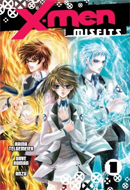   |
Author: Raina Telgemeier & Dave Roman
Artist: Anzu
Publisher: Del Rey
Rating: Teen (13+)
Release Date: August 2009
Synopsis: “High school student Kitty Pryde has always been the odd girl out. A mutant, she was born with strange powers, magical talents that make her the class freak. But Kitty’s world is changed when she’s invited to study at Professor Xavier’s School for Gifted Youngsters, a special home for mutant teens. There’s just one catch: Kitty’s the only girl at the all-boy school, and she ends up just feeling like a freak all over again.”
Kitty Pryde is a young teenager with a secret: she has the ability to phase through solid objects. Confused and apprehensive, she is invited to be the first female student in Xavier’s Institute, a private school for ‘the gifted’. There she meets an assortment of characters, and though they may have their strange abilities in common, not all have the same agenda for being there. But, when surrounded by pretty boys and being the only girl, Kitty has more than her own problems in mind in this intentionally shoujo-styled re-imagining of Marvel’s X-Men.
Getting right to the point, it’s unfortunate that I found this story takes its shoujo elements a little too far, while at the same time failing to grasp the particular character-driven charm that many shoujos garner their popularity from. The main character, Kitty, is stripped to the bare bone of personality, barely thinking for herself outside the box of airy teenage-girl protagonist and with a loss of the spunk that the original character is known for (and I thought should’ve been emphasized on). The story resorts to inner monologues derivative of any teenage-angst about not belonging, which both serves and panders to the book’s target audience while rarely feeling very substantial.
Other characters in the story fare worse than her, most of whom blend together into a near unrecognizable mass of pretty boys with few defining characteristics between them. Until you see a power utilized or a name tossed about, you’re likely to have trouble differentiating the characters from one another for a majority of the book. Most of those introduced are part of a team of mutants called Hellfire, an originally intimidating assortment of rule-breakers who are instead demoted to the role of occasional rule-benders who live a lifestyle that felt notably similar to those of Ouran Host Club (except they only have Kitty to pamper now and again). All students now wear expensive looking school uniforms and are free to live the life of generally unsupervised rich kids within school walls.
The plot itself hampers the potential conflict of the story immensely, but yet on the upside, I have to say the writing does manage to stand out as pretty exceptional on a character-by-character basis. One example is Cyclops, or Scott Summers, re-imagined here as an activist teenager who is a strict vegan and a fan of attending social protests. I personally thought this was pretty well handled (and fun to read on top of that), even if I do miss his position of being more or less in charge (which could still occur as the story progresses). Professor X, or Charles Xavier, was the best written for character from a standard X-Men point of view. His short speeches were straight out of any Marvel book before and far from feeling repetitive, they instead allowed the story to feel more connected to its source material, a pleasant reprieve from a book that otherwise doesn’t seem quite as keen to target both shoujo readers and old Marvel fans as I would’ve liked (we crossover-fans exist you know!). Even Magneto, aka Mr. Leensher, here a fellow teacher at the school, still has some trademark opinions to him that foreshadow his coming evolution to a more familiar position as adversary.
Plot-wise the majority of the book follows Kitty getting to know what there is to know about the students introduced. She gets an inkling that the Hellfire Club are not the safest guys in the school to hang around with and she also starts developing a crush on the stoically uninterested and blunt, Bobby (aka Iceman) who is of the course the rudest and most uninvolved with her throughout the duration of the story. The overtones of mutant oppression are muted in X-Men Misfits but do come a little more into the forefront of the story at the book’s end when the Hellfires collide with an anti-mutant protest group.
I was a little confused though, if not a tad perturbed, as to why Kitty is the only female in the entire school; no girl mutants out there? No one with powers cool enough to be accepted? What? It seems too far stretched to have gone without explanation as it did when the book’s opening tried to emphasize the decent sized population the school already had. Or perhaps this merely ties into the shoujo-intent, allowing Kitty to be the sole-female in order to further capitilize on the harem-esque parts of the book (especially with the next book introduces another girl for what sounds like pure rival purposes).
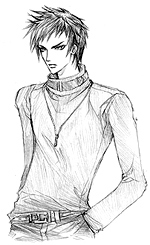
On the artistic side, every character has been re-imagined as a wispy, pretty-boys with eerily similar faces, host-club styled school uniforms and way too many sparkles. There isn’t enough uniqueness to them as individuals to be either eye-catching or memorable, and this along with some stick-figure anatomy that falls just short of working style-over-function, serves as one of the greatest downfalls of the book.
An amusing exception to my general hoe-hum at the redesigns however would be Hank McCoy (also known as Beast). His design is downright cute and cuddly, well described as Totoro-ish in appearance. While initially I thought the idea was ridiculous, I actually found I liked it in the context of the story. Sorry Hank, you just worked out pretty amusing as a big ball of stressed out fluff. Humour in general was the art’s best features and I did have a few mild chuckles at some exaggerated moments, whether intentional or not. Storm, with one of her more interesting designs chosen, does look pretty snazzy too.
Still, the art style overall, though not all that bad on its own, I thought over-emphasized the flaws already present in the story itself: mainly the shallow characters, the majority of whom are all too similar. I honestly didn’t think the art worked with the story because it alienated it too far from the source material without adding to the intent of the story past covering everything in a genre-stereotypical glaze.
As an overall package, X-Men Misfits truly is the sum of its parts, both of which unfortunately just didn’t flow that well together. The book did leave me believing that a shoujo-format X-Men story could be possible, but to be successful it would need a lot more depth and far less sparkle than what is offered in this first volume. I’m not sure how someone outside the X-men fandom would find this work, but from a long-time reader of both X-Men and manga, I was left momentarily amused but ultimately disappointed. I do still however have hopes that the second volume could fare better at finding solid footing for itself and move past being simply a weak mish-mash of pop-culture.
Review written August 14, 2009 by Lissa Pattillo
Book provided by Del Rey for review purposes


 Follow
Follow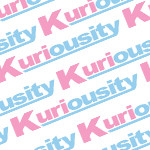





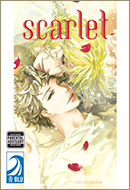








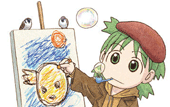









[…] This post was Twitted by AnimeKiosk […]
[…] (Slightly Biased Manga) Julie on vol. 1 of X-Men: Misfits (Manga Maniac Cafe) Lissa Pattillo on vol. 1 of X-Men: Misfits (Kuriousity) Erica Friedman on vol. 17 of Yuri Hime (Part 2) (Okazu) Shevaun Morrison on vol. 6 of […]
It sounds like the type of shoujo I love to hate. (I mean COME ON, guys, there are other types of shoujo to emulate!) It sounds like a train wreck.
…
I have to pick up this book. HAVE TO. Just so I can see how they gave a comic with a dominantly male following a bad shoujo makeover. (I’d rather read Wolverine the shounen)